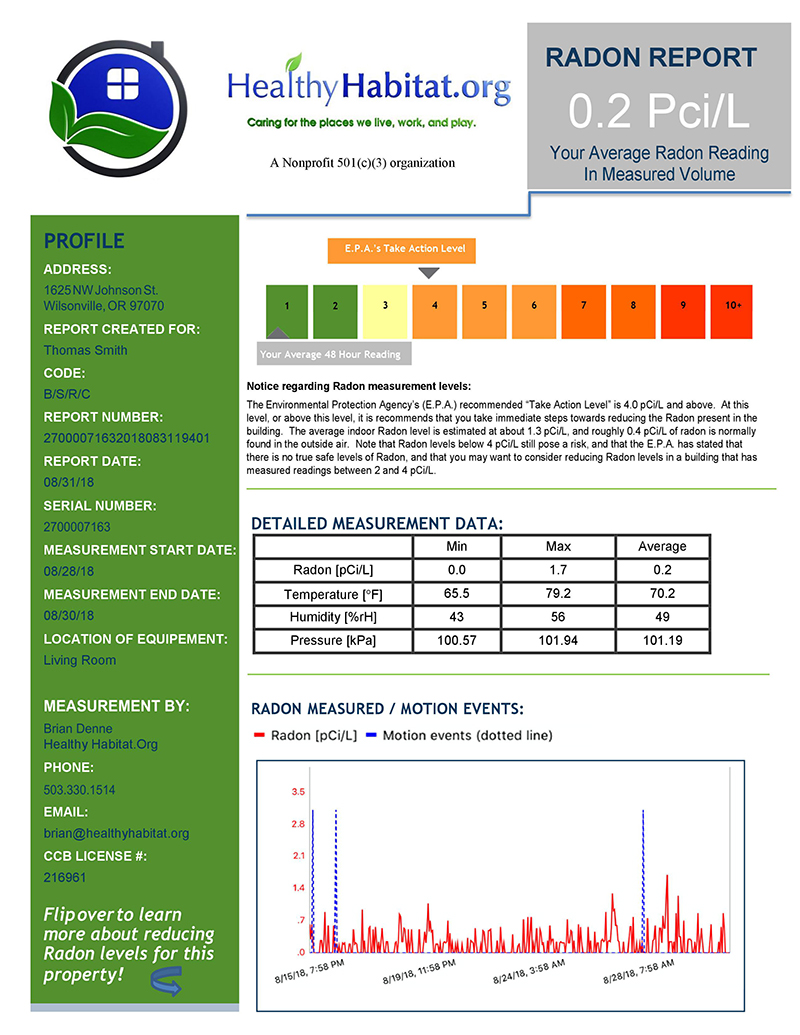Radon Testing is essential in the Portland Metro Area
Did you know that 28% of Portland homes tested are found to contain high levels of radon? Or that radon levels can change over time, and vary from home to home?
Most home purchases involve radon testing as part of the inspection process. If you already own a home, it’s a good idea to check your radon exposure level every couple of years. Healthy Habitat can provide accurate and timely radon testing results without disruption to your property.
Here’s how it works: We set up an electronic radon detection device to test your home for a period of 48 hours. When we come back to pick up the device, we produce a full report which is emailed to you the very next day. Our reports are detailed yet easy to read, providing recommendations on what steps to take if high levels of radon are present in the property.
RESIDENTIAL HOME RADON TESTING
- Meets EPA.’s radon testing requirements
- Suitable for any home in the Metro Portland Area
- Quick, accurate reports
- Report provides high, low and average radon concentrations over the testing period
- Easy online scheduling
- (Call for Commercial building pricing)
FAQ
Radon is an odorless, colorless, tasteless radioactive gas that is emitted from the ground beneath a property and can penetrate most building materials. There is no way of knowing whether a building has a significant level of radon without performing a test.
Yes, radon exposure has been directly linked to cancer. In fact, radon is the the second leading cause of Lung Cancer in the United States. The Environmental Protection Agency estimates that over 21,000 Americans die each year from indoor Radon exposure.
Radon tends to seep up from the ground through basements and crawl spaces, and it can also pass right through concrete slabs. Working its way upward through the floors and walls of the building, it can become trapped inside living spaces. Because radon can’t be seen or smelled, detection without equipment is simply impossible.
In the US overall, one in every 15 homes is estimated to contain elevated levels of radon. But the Portland area seems to show an even higher risk of radon occurring at high levels inside of homes and buildings. According to the Oregon Health Authority’s Radon Risk Map, this risk is especially concentrated around Northeast Portland. In total, 11 Portland zip codes are at especially high risk for radon.
Yes, you have the right to test (and you should test) any building for Radon before you purchase it. The National Association of Realtors recommends radon testing on every home purchase, which is why we work with hundreds of local Realtors every year to ensure that accurate test and reports are provided to home buyers.
Our standard test lasts 48 hours, and is performed using a Continuous Radon Monitoring Device (CRMD). This electronic device is the size of a small laptop and is battery powered. It records the level of concentrated radon in the room every hour, measuring in pCi (picocuries) per liter of air. Generally we will set up the CRMD on day one, pick up the machine anytime after 48 hours later, and provide the results of the testing on the very next business day.
The Radon report will provide the hour-by-hour pCi/L levels, as well as the high, low, and average level for the recording period. If the average radon level is above 4 pCi/L, we will recommend mitigation steps to reduce the level in the home or building.
Yes, our team works directly with homeowners, builders/developers, and realtors. Once your Radon testing is complete, we will provide you with detailed results, including any recommended actions to take. We can also provide a copy of the report to your realtor if you like. If the home has a high average radon level above 4 pCi/L, for which mitigation is highly recommended, your realtor will need our detailed report to use when negotiating he purchase of the property.
If your test results show that the home is above 4 pCi/L and mitigation is needed, we will provide recommendations in the report. There is no one-single “radon solution” for homes. Mitigation practices vary based on how the home is constructed, but can include blocking or venting the radon. However, there are currently no required actions that homeowners need to take to mitigate radon. You have the choice as to what step you may or may not take after receiving the results of your radon test.
Mitigation systems and cost may vary based on the home’s size, construction style, foundation type, and more. Generally, radon mitigation costs are between $2,000 and $4,000. An upfront quote from a licensed contractor is always the best way to determine exactly what to budget for the work in advance.


Add Comment